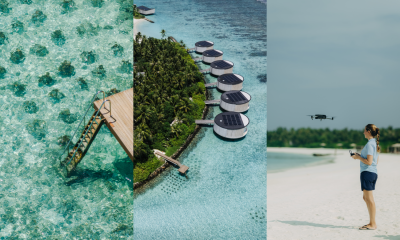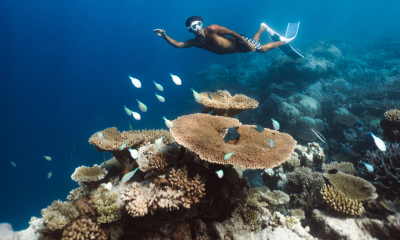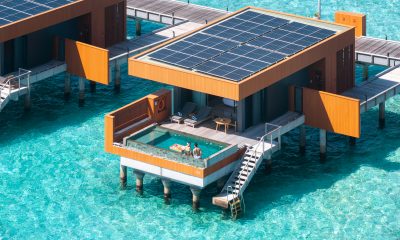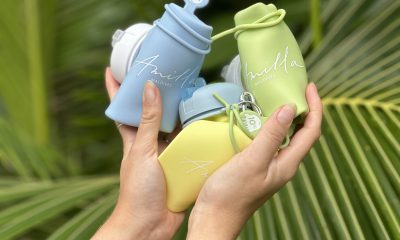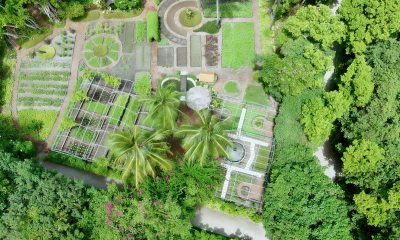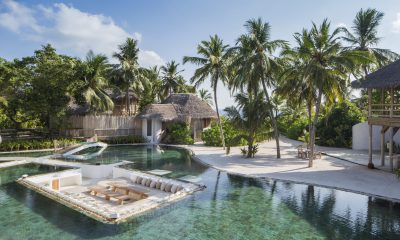Featured
Soneva looks back at 2019 sustainability achievements
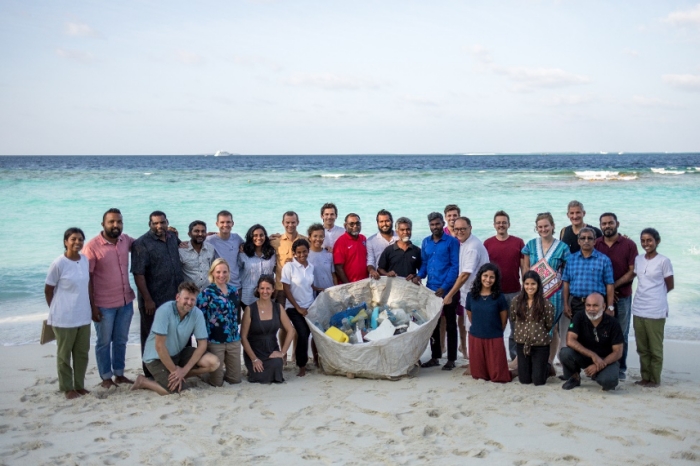
Soneva, the world-leading luxury resort operator with properties in the Maldives and Thailand, is celebrating the success of world-leading environmental projects spanning 25 years.
These have included subsidising low-carbon cook stoves, mangrove conservation, sea grass restoration and hosting international sustainability dialogues on fisheries and marine plastics.
The combined investment of close to $10 million has positively impacted over a million people, and saved over half a million tons of carbon dioxide emissions, the equivalent of taking over 100,000 cars off the road for a whole year.
Last year’s achievements
Soneva generated $553,000 in value across its resorts from the upcycling of waste through the Waste to Wealth initiative.
A total of 65,250 paper straws were used last year, which could have easily been plastic straws had Soneva not banned them in 2008.
Soneva sold 71,400 litres of water in reusable glass bottles, preventing the manufacture of 47,600 single-use plastic bottles.
A total of 900 kg of aluminium cans were compacted and sent for recycling, while 2,400 square metres of Styrofoam was repurposed and used in building Soneva’s villas.
At Soneva Fushi’s Eco Centro, 9,000 kg of charcoal (worth $14,400) was made. The Eco Centro also produced 20,000 kg of compost each month from daily waste food and organic matter.
Through Soneva’s Learn to Swim programme, 70 Maldivian school children learnt how to swim. Four lifeguards were also trained from Maldivian communities by Soneva host.
Around 30 litres of coconut oil were made (from approximately 675 coconuts) each month from the coconut trees at Soneva Fushi.
Each Soneva resort has its own Waste-to-Wealth facility, recycling 90 per cent of its waste through an innovative waste management strategy.
Food left over from the resorts’ restaurants is composted to make nutritious soil for the islands’ vegetable and herb gardens, all of which are organic and provide much of the produce used in the kitchens at each resort. Styrofoam packing is used to make lightweight construction blocks or as insulation within villa walls.
Soneva is aiming for 100 per cent of its waste to avoid ending up in landfills by 2030.
Currently, 12 per cent of Soneva’s total energy usage at the three resorts is from renewable sources. Soneva aims to increase this to 50 per cent, and by 2025 it aims to be using 100 per cent renewable energy.
Another aspect of the Waste to Wealth initiative is Soneva Fushi’s Art and Glass Studio, the only hot glass studio in the Maldives.
Here, approximately 1,200 used glass bottles from Soneva Fushi, Soneva Jani, and neighbouring resorts in the Baa atoll are crushed and melted down each year to be upcycled. Then using techniques such as glass blowing, casting, and slumping, the Soneva glass team creates functional pieces as well as one of a kind glass sculptures, which can be bought from the Art and Glass Studio.
For an island nation like the Maldives, which relies on its natural scenery for tourism and with fish as the main food staple, waste is a massive problem. This is why Soneva started the Soneva Maker Programme at Soneva Fushi.
This programme sees Soneva join the grass-roots Precious Plastic global initiative to become the first company in the Maldives to recycle plastic into new products, using open-source machines made from locally available, low cost materials.
Soneva Water
Soneva banned imported bottled water in 2008. Instead, Soneva filters, mineralises, alkalises and bottles its water on-site.
Soneva has averted the production of 1,500,000 plastic bottles in the last 10 years by using reusable glass bottles.
A percentage of revenues from Soneva Water funds over 500 clean water projects in more than 50 countries. It provides clean water to over 750,000 via charities such as Water Charity and Thirst Aid.
Soneva Namoona
In 2019, Soneva launched Soneva Namoona, a partnership between three Maldivian islands (Maalhos, Dharavandhoo and Kihaadhoo), Soneva, marine plastic foundation Common Seas, and the Maldivian government to change the way the island nation manages waste.
In February, the island of Maalhos inaugurated its Eco Centro and water bottling plant; and marked the end of open burning on the island.
Under Soneva Namoona, Soneva Water provides drinking water to households and guesthouses on the local island of Maalhos in reusable glass bottles, reducing the need for single-use plastic water bottles on the island.
A new Soneva-sponsored Eco Centro ‘waste-to-wealth’ centre enables composting and recycling of waste on Maalhos.
This year, Soneva Namoona is being extended to the local islands of Dharavandhoo and Kihaadhoo.
Following meetings and workshops hosted by Soneva Fushi in 2019, Maldivian President Ibrahim Mohamed Solih made a pledge at the United Nations General Assembly for the country to become single-use plastic free by 2023.
Soneva Namoona will continue working with the national government to broaden this pioneering approach out to the whole of the Maldives.
Soneva Namoona centres around the three pillars of Reduce, Recycle, Inspire.
Reduce is a radical reduction in the volume of plastic arriving on the islands. Soneva assisted in the establishment of a water bottling plant on the island of Maalhos to desalinate and mineralise sea water, which is distributed in reusable glass bottles, eliminating the need for water bottled in plastic.
Recycling and responsible disposal of waste forms the second strand of the programme. Maalhos is the first island to open a Soneva-sponsored Eco Centro with machinery that will include a wood chipper and a glass crusher.
The third component is to Inspire a love of the ocean and the environment. The belief is that through water sports, education and festivities that children will lose their fear of the ocean and learn to love it, and thus protect it.
“If we work together, we are sure we can create the right environment for the Maldives to be the world’s most progressive country on single use plastic. If we project forwards just a few years, we can see that all islands will have thriving waste-to-wealth centres; there will be no plastic bags; no plastic straws; islands will have their own water bottling plants; no guesthouses or resorts will serve water in single use bottles,” Sonu Shivdasani, CEO and Founder of Soneva, says.
Ongoing initiatives
At the start of the last decade, Soneva partnered with PATT Foundation in Thailand to plant over 500,000 trees covering 300 acres in the Chiang Mai region of northern Thailand.
The plantations, covering three main sites, use a Framework Species Methodology, with guidance from Forest Restoration Research Unit of Chiang Mai University.
Ninety species of trees were planted in 2011-12 and since then, seed-disbursing birds have increased the number of species further to create a rich biodiverse forest.
Over 40 years, the project will mitigate an estimated 255,000 tons of carbon dioxide.
Neighbouring Myanmar has one of the fastest rates of deforestation in the world with most of the wood used for domestic cooking. Pollution from indoor cooking on open fires leads to the premature deaths of over four million people a year, mostly women and children, which is more than HIV/AIDS and malaria combined.
Soneva has subsidised the distribution of fuel-efficient cook stoves to around 150,000 people through the Myanmar Stoves Campaign. Each stove saves 2.5 tonnes of wood per year and reduces air pollution by 80 per cent, improving the health and safety of the whole community.
“At Soneva, we believe that luxury and sustainability don’t compete; they complement each other. I have always believed that businesses must be a positive force for change, so if you support businesses that create jobs in their communities and protect the environments in which they operate, this can be very beneficial,” Shivdasani says.
In 2016 Soneva hosted The Soneva Dialogue: Transformative Risks and Opportunities for the Global Seafood Industry.
The dialogue was the first in a series of Keystone Dialogues, in partnership with The Stockholm Resilience Centre and Forum for the Future.
The dialogue resulted in the establishment of Seafood Business for Ocean Stewardship (SeaBOS). The ambition is for scientists and the world’s largest seafood companies to join forces to lead a global transformation towards sustainable seafood production and a healthy ocean.
The initiative will actively contribute to the United Nations Sustainable Development Goals (SDGs), and in particular Goal 14 – Conserve and sustainably use the oceans, seas and marine resources.
Soneva’s top 25 community projects:
- Soneva Namoona
- Myanmar Stoves Campaign
- Darfur Stoves Project
- Soneva Forest Restoration
- Soneva Wind Turbine
- Soneva Clean Water Projects
- SLOW LIFE Symposium
- WHOLE WORLD Water
- Soneva Dialogue
- Soneva Ocean Stewards
- Soneva Eco Camps
- Care for Children
- Restaurants Against Hunger
- Baa Atoll UNESCO Biosphere Reserve
- Coral Reef Restoration
- Soneva Junior Master Chef
- SHE Thalassaemia
- Soneva Medical Camp
- Care Development Center
- FINished with Fins
- Kudarikilu Waste Water Plant
- Dharavandhoo School Science Laboratory
- Bahiyya Pre School Reconstruction
- Green School Scholarship
- IUCN Mangrove Conservation project
For more details on Soneva’s sustainability initiatives and the Host Changemakers series, please visit sonevachangemakers.com.
Cooking
Patina Maldives hosts Chef Shannon Bennett for exclusive April residency

From 1 to 5 April 2026, Patina Maldives, Fari Islands will host Shannon Bennett, one of Australia’s most recognised culinary figures and the creative force behind Belongil. The residency brings together a chef known for shaping dining as an emotional and reflective experience with a destination defined by perspective, creativity and purpose.
Bennett’s career extends beyond traditional notions of cooking. Through projects such as Vue de Monde and Belongil, he has explored dining as a medium for memory, connection and emotion, placing emphasis on experience rather than consumption. His approach centres on creating moments that remain with guests long after the meal has ended.
At Patina Maldives, the residency represents a convergence of shared values. Over five nights, guests are invited to take part in a limited series of dining experiences shaped by intention, curiosity and a sense of place. Rather than recreating Belongil in another setting, the programme evolves its philosophy, drawing inspiration from the natural rhythm and clarity of the Maldivian environment.
Commenting on the collaboration, Bennett said Belongil was conceived as more than a place to eat, but as a space for ideas, connection and lasting moments. He noted that Patina Maldives reflects a similar sense of purpose, adding that bringing his work into the island setting offered an opportunity to create experiences that feel grounded, honest and meaningful.
Patina Maldives continues to develop its identity by providing a platform for global creative voices to shape new conversations and perspectives. The residency with Bennett aligns with this approach, positioning cuisine as one element within a broader cultural and experiential narrative.
Tom Bray, Director of Lifestyle at Patina Maldives, said the resort exists to bring people closer to ideas, creativity and self-discovery. He added that welcoming Bennett reflects this philosophy, describing the residency as an experience designed to shift perspective rather than focus solely on gastronomy.
The residency is presented as an experience defined by intention rather than spectacle. Taking place over five nights on a single island, it brings together Patina Maldives and one of the culinary world’s most reflective minds for a programme shaped by presence, purpose and a sense of moment that cannot be replicated in the same way again.
Featured
You & Me Maldives unveils curated Premium All Inclusive programme
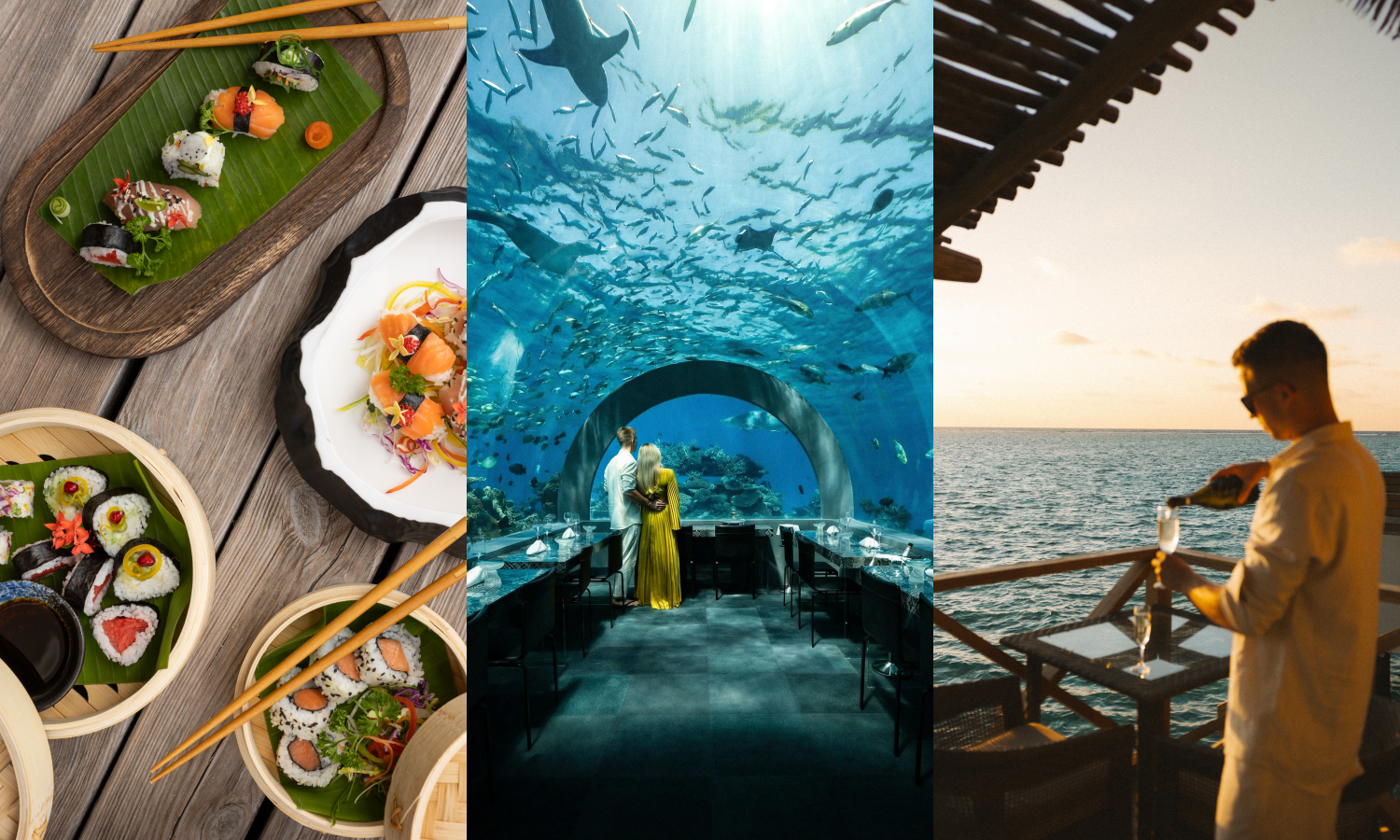
You & Me Maldives, the adults-only luxury retreat under The Cocoon Collection, has announced the launch of its new Premium All Inclusive experience, aimed at enhancing island stays through a more seamless and comprehensive offering in the Indian Ocean.
The Premium All Inclusive experience is designed to begin from the point of arrival. Guests receive complimentary access to The Cocoon Collection Lounge at the seaplane terminal at Velana International Airport, where services are provided to ensure a smooth transition before the journey to the resort.
On arrival at the island, guests are welcomed in their villas with a chilled bottle of sparkling wine and a selection of canapés. The Premium All Inclusive plan includes unlimited premium beverages by the glass, featuring a curated range of wines, signature cocktails, top-shelf spirits, international beers and non-alcoholic options. The in-villa minibar is replenished daily with soft drinks, international beers, red and white wines, as well as assorted snacks. For stays of five nights or more, guests also receive two bottles of premium liquor from a selected list, provided once during the stay.
The experience further includes a range of activities. Guests staying a minimum of three nights are offered one sunset cruise and one snorkelling excursion per stay, while those staying seven nights or more are entitled to a catamaran cruise. Unlimited use of snorkelling equipment and non-motorised water sports, including canoeing, kayaking and paddle boarding, is also included, subject to weather conditions.
Dining forms a central part of the Premium All Inclusive concept. Guests can enjoy three themed dining evenings, including a seafood barbecue under the stars featuring prawns, lobster and oysters. For stays of five nights or more, guests may also take part in a complimentary group cooking class, with a choice between ethnic or Italian cuisine, led by the resort’s culinary team.
Wellness offerings are also incorporated into the programme, with guests able to participate in up to three complimentary sunrise yoga sessions per stay, subject to availability.
The introduction of the Premium All Inclusive experience reflects the resort’s focus on personalised service and carefully curated stays. The offering is positioned to appeal to couples seeking relaxation, romance or activity-led experiences within an adults-only island setting.
Featured
Eid celebrations at SO/ Maldives blend Arabic tradition and Maldivian culture

SO/ Maldives is inviting global travellers this season to reimagine Eid not merely as a holiday, but as an immersive island escape. Located just 15 minutes by speedboat from Malé, the fashion-forward private island retreat sets the stage for a celebration where cultural heritage, contemporary luxury and tropical glamour come together.
At the centre of the festivities is an authentic culinary experience at Hadaba, the resort’s award-winning Arabic restaurant. Guests are offered Levantine flavours, artisanal mezze and traditional recipes presented with a modern approach, creating a setting for shared dining and celebration. As part of the resort’s dine-around concept, Hadaba can be included in a wider culinary journey across the island, allowing guests to experience Arabic cuisine alongside the resort’s other dining venues.
As evening falls, celebrations move to Lazuli Beach Club, where shisha rituals and Arabic-inspired refreshments are served in a beachfront setting. Traditional performances are complemented by Maldivian Boduberu drumming and fire dance displays, creating a cultural programme designed to appeal to international travellers seeking meaningful experiences.
Across the island, Eid is marked through a series of curated activities aimed at encouraging connection and creativity. Cultural workshops, including palm-leaf artistry and henna sessions, offer opportunities to explore heritage, while younger guests are engaged through themed crafts, interactive games and sweet treat decorating. The overall atmosphere remains celebratory while maintaining a relaxed pace that reflects the resort’s character.
Beyond the festive programme, the resort positions the long weekend as a fully immersive island retreat. Guests stay in beach and overwater villas featuring private pools and ocean views, with interiors inspired by high fashion. Time is spent between spa treatments, lagoon activities, beach club experiences and sunset dining, balancing celebration with seclusion.
To mark the season, the resort has introduced two limited-time stay offers. The One Night on Us offer provides savings of 33 per cent on stays of three nights or more, along with daily breakfast, complimentary transfers and spa privileges. The Soo Summer package offers preferential rates combined with spa experiences, curated dining inclusions and additional benefits for water villa stays.
Welcoming travellers from Europe, Asia, the Middle East and beyond, the resort presents Eid as a global celebration where Arabic traditions, Maldivian culture and contemporary design are brought together. This season, guests are invited to exchange routine for island surroundings and experience Eid through a redefined island perspective.
-
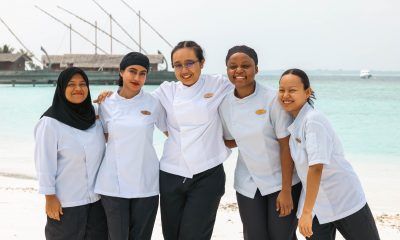
 Cooking1 week ago
Cooking1 week agoWomen at heart of kitchen: Milaidhoo Maldives marks International Women’s Day through gastronomy
-
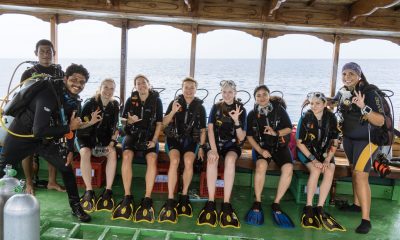
 Action1 week ago
Action1 week agoAtmosphere Foundation launches annual dive training scholarship for Maldivians
-
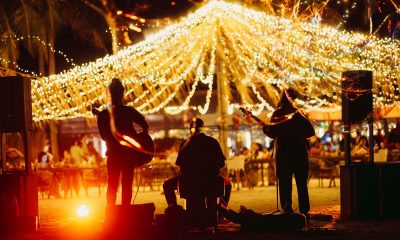
 Entertainment1 week ago
Entertainment1 week ago‘One festival, every sense’: Fari Islands Festival announces August 2026 return
-

 Family1 week ago
Family1 week agoEaster goes playful at The Standard, Maldives with week-long Angry Birds celebration
-
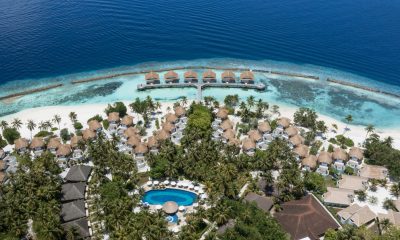
 Awards1 week ago
Awards1 week agoBandos Maldives earns Booking.com Traveller Review Award 2026
-
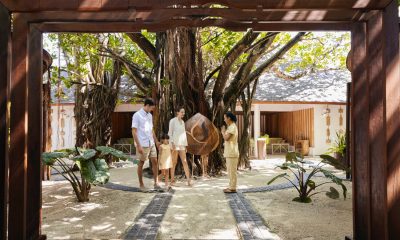
 Featured1 week ago
Featured1 week agoAncient banyan tree anchors spiritual experiences at Machchafushi Island Resort
-
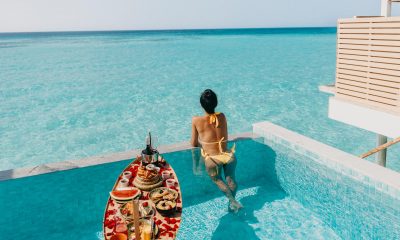
 News1 week ago
News1 week agoMeyyafushi Maldives opens with focus on design-led all-inclusive experiences
-
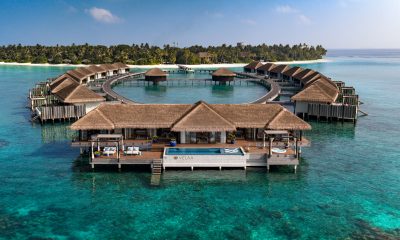
 News6 days ago
News6 days agoRefined overwater vision: Velaa Private Island’s upgraded Ocean Pool House



